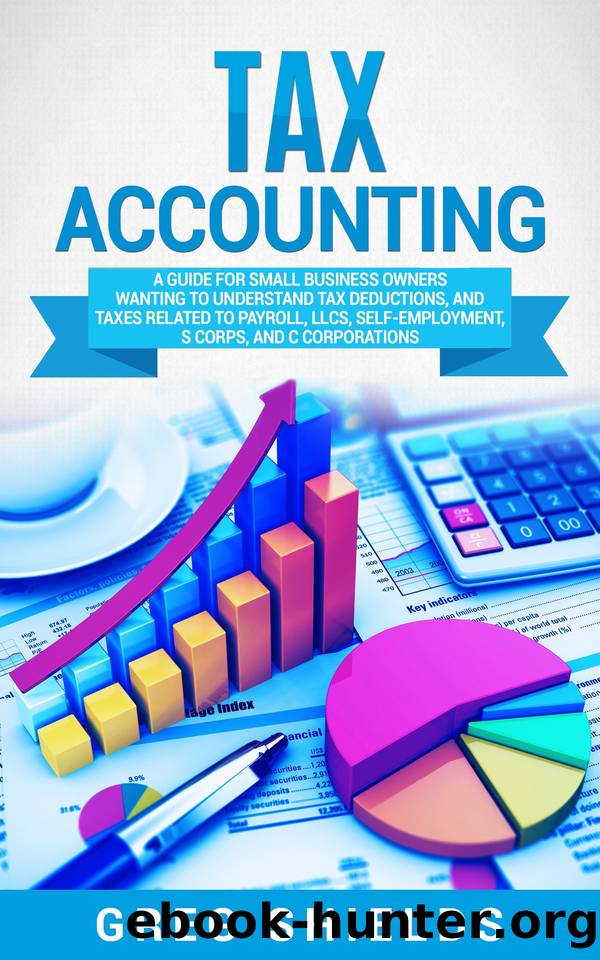Tax Accounting: A Guide for Small Business Owners Wanting to Understand Tax Deductions, and Taxes Related to Payroll, LLCs, Self-Employment, S Corps, and C Corporations by Shields Greg

Author:Shields, Greg [Shields, Greg]
Language: eng
Format: epub
Published: 2021-01-08T00:00:00+00:00
Chapter 6: Why a Business Entity is Important
As a businessperson, the type of business or industry to get into isn't the only thing you have to decide on. You will also need to think carefully about the structure or entity your business will be. Why?
There are two very important reasons: taxes and personal liability. Believe it or not, the business entity you register can directly affect the kinds and amount of taxes you will need to pay. For example, structuring your business as a company or a corporation entitles it to a flat income tax rate. And if you structure your business as a sole proprietorship or a partnership, taxes on income from these will be filed under your own, and thus, you will be paying graduated income tax rates.
Depending on your expected or target annual net income, one type of tax rate can be beneficial compared to the other. For businesses, paying a flat corporate tax rate can be more tax-efficient compared to paying an individual but graduated one. This is especially so when the business is making lots of money, just like the top American companies do.
But if your income isn't as high as major corporations' annual profits, paying taxes on income based on an increasing rate may be more practical. If you're earning $10,000,000 in net income annually, you will be paying the top rate for individual income taxes. However, you may have to pay more than half of your income in taxes because of the tax bracket. But if you are a flat corporate tax rate, you won't be paying as many taxes because regardless of the size of your income, the rate is fixed.
Also, your personal liability for claims made against your business is contingent on the business structure you adopt. Case in point, sole proprietorships. If you structure your business like this and it goes bankrupt, its creditors and other parties with a financial claim on it can go after your personal assets. But if you establish a corporation instead, such parties can only go after the business's assets to settle their claims.
Common Types of Business Entities
While we will be going into more detail about the business entities you can establish in the United States, here are the most common business entities in the United States:
⢠Sole proprietorships
⢠Partnerships
⢠Limited Liability Corporations (LLCs)
⢠Corporations (C And S)
Business Entities: The Accounting Concept
The business entity concept of accounting also called an economic entity or the separate entity concept, requires that all financial transactions of a business be distinguished and separated from that of its owners or other businesses. It means that each business's finances must not be commingled with anyone or anything else's.
What does this mean? When funds go in and out of your business, their movements must be recorded in their own books of accounts or accounting records. As a business owner, you can â and you should - apply this concept to your business regardless of its structure or entity type. Doing this can make the accounting and bookkeeping process is so much easier and accurate.
Download
This site does not store any files on its server. We only index and link to content provided by other sites. Please contact the content providers to delete copyright contents if any and email us, we'll remove relevant links or contents immediately.
Zero to IPO: Over $1 Trillion of Actionable Advice from the World's Most Successful Entrepreneurs by Frederic Kerrest(4510)
Machine Learning at Scale with H2O by Gregory Keys | David Whiting(4292)
Never by Ken Follett(3937)
Harry Potter and the Goblet Of Fire by J.K. Rowling(3848)
Ogilvy on Advertising by David Ogilvy(3604)
Shadow of Night by Deborah Harkness(3358)
The Man Who Died Twice by Richard Osman(3072)
Book of Life by Deborah Harkness(2930)
The Tipping Point by Malcolm Gladwell(2914)
Will by Will Smith(2908)
0041152001443424520 .pdf by Unknown(2843)
My Brilliant Friend by Elena Ferrante(2824)
Purple Hibiscus by Chimamanda Ngozi Adichie(2823)
How Proust Can Change Your Life by Alain De Botton(2805)
How to Pay Zero Taxes, 2018 by Jeff A. Schnepper(2646)
Hooked: A Dark, Contemporary Romance (Never After Series) by Emily McIntire(2547)
Rationality by Steven Pinker(2352)
Can't Hurt Me: Master Your Mind and Defy the Odds - Clean Edition by David Goggins(2323)
Borders by unknow(2303)
